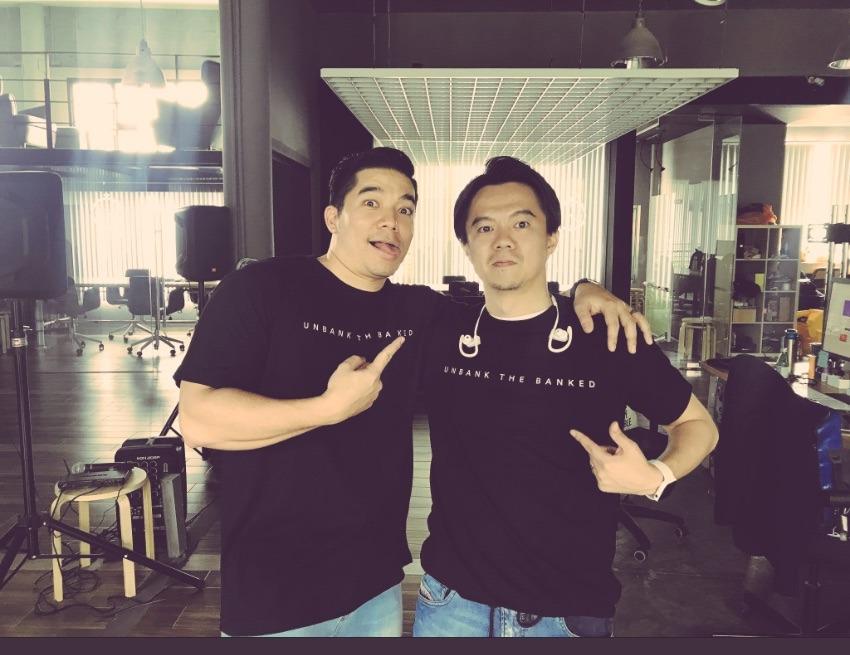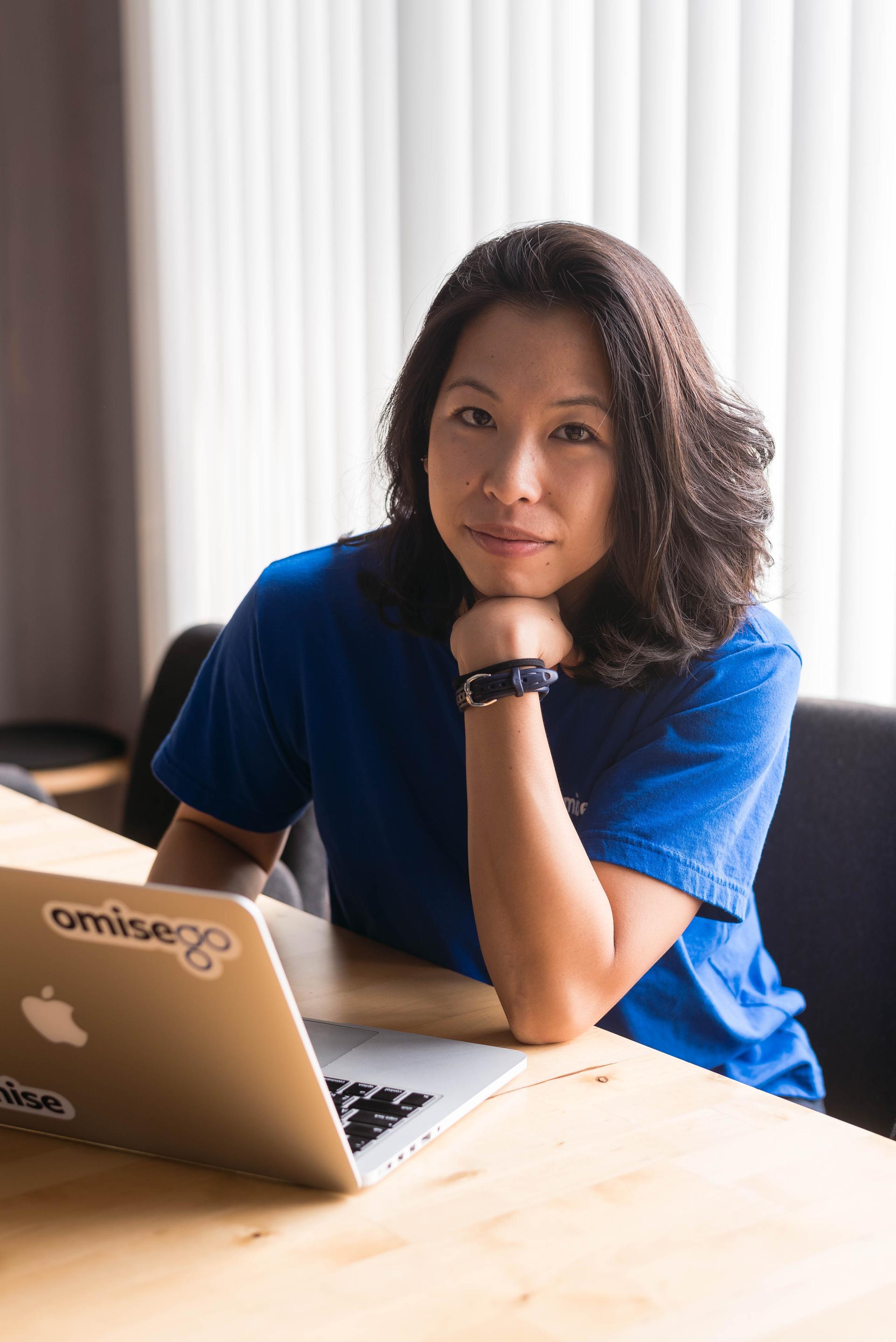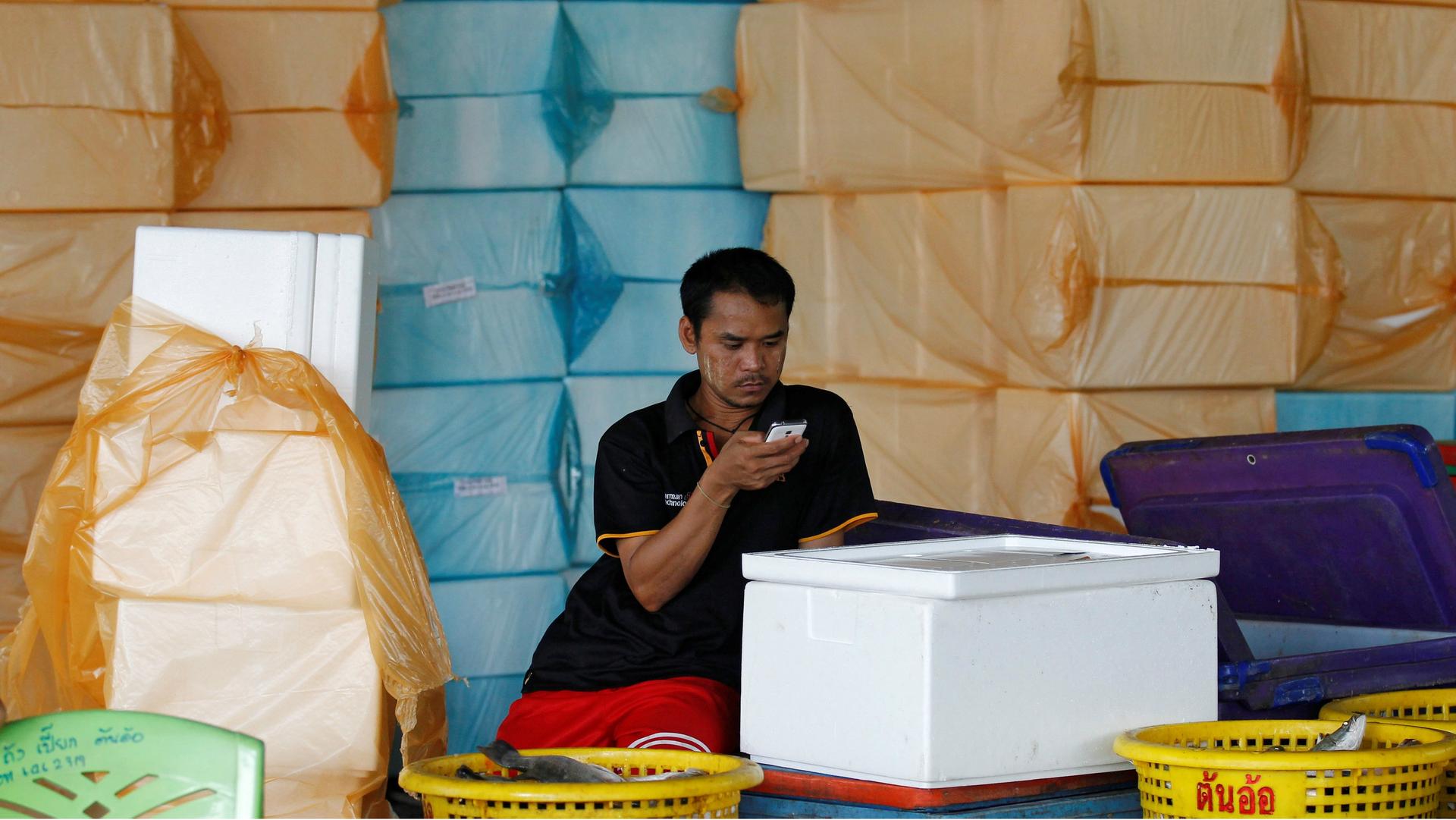A tech startup called OMG wants to revolutionize cash for hundreds of millions of ‘unbanked’ people in Asia
A migrant worker from Myanmar looks at his cellphone at a wholesale market for shrimp and other seafood in Mahachai, in Samut Sakhon province, Thailand, July 4, 2017. Hundreds of millions of people in Southeast Asia don’t have bank accounts because they lack capital, documents or status. But many of these same people have cellphones, and a new startup called OmiseGO hopes blockchain technology can give them access to digital cash.
In their plucky startup days, Facebook and Google oozed adolescent optimism. Facebook offered to stitch the Earth’s scattered societies into one giant community. Google, vowing to “do no evil,” offered a portal to the sum of all knowledge. Supposedly for free.
Now that they are among the most powerful non-state institutions ever assembled, both firms face a public wary of their promises. But anyone nostalgic for that mid-2000s utopian zeal need only wade in the world of blockchain — the technology sector’s bleeding edge.
This is a realm of code-writing rebels, starry-eyed do-gooders, a gaggle of charlatans and a few supergeniuses. They are gripped by faith in blockchains: unhackable online super databases, run not on some corporation’s central server but on thousands of privately owned computers worldwide.
Like Facebook and Google before them, blockchain evangelists say they’re poised to transform societies in short order. The best-known blockchain creation is, of course, bitcoin, that notoriously volatile currency liberated from any central bank’s control.
But among the dozens of other prominent blockchain projects — most of which are only quasi-operational — one is remarkable both for its developers’ location and the audacity of its ideas.
It’s called OmiseGO, often shortened to OMG.
Its creators aren’t headquartered in some sleek Silicon Valley campus. They work from a spiffy office inside a shopping mall in the suburbs of Bangkok. Their neighbors include a hair salon and a furniture store.

In lieu of targeting affluent and tech-savvy enclaves in US and Europe, they see a future in Asia. Namely among hundreds of millions of hard-laboring people who don’t even have bank accounts. Think taxi drivers in Manila, noodle sellers in Indonesia or migrants from Myanmar. The startup calls them “the unbanked.”
“Look at financial systems today. Look at banks. There are barriers to entry, to just getting an account,” says Vansa Chatikavanij, OmiseGO’s managing director. She is a Columbia University graduate from Thailand who worked for the World Bank before diving into the tech scene.
“Our view,” she says, “is that having the ability to transact money easily should be seen as a human right.”
OmiseGO is steeped in this ideology. The team envisions a world where cash is digital and free flowing, stored on blockchains, accessible by smartphones and effortlessly zapped across borders.
Related: Blockchain seems to be all the hype these days. But what, exactly, is it?
Those in the West — accustomed to tapping their bank balances via Apple Pay and Venmo — may feel this is close at hand. But the same can’t be said for much of the world. More than 70 percent of Southeast Asia’s 600 million people are “unbanked,” so to speak, because they lack capital, documents or status.
Millions struggle under this status quo.
“This lack of access has created major barriers for people to overcome poverty by making it almost impossible for them to borrow or save money,” says Jan Reinmueller of the consulting firm KPMG in Singapore.
And yet these populations — farmers, merchants, migrants and factory hands — are now quite likely to own smartphones, use chat apps and post on Facebook.
Reinmueller’s conclusion: This puts cutting-edge financial tech projects in a position to “radically shift the economic foundation of the region” and become a “lynchpin for more than just economic change, but for true social change.”
It’s likely that some entity will seize this opportunity in Asia. Whether OmiseGO will be the one is an open question.
“Blockchain is still daunting. It’s like the internet when it first started. People doubted it. It seemed so complex,” Vansa says. But if OmiseGO succeeds, she says, “people won’t need to know how blockchain works. They’ll just know that it does work.”
Breaking down the concept
Here’s how someone might use actually use this technology in their daily life.
Say you’re among the 2 million migrants who’ve left Myanmar — among Asia’s poorer nations — to find work in Thailand, the economic anchor of mainland Southeast Asia.
You may lack the right papers to get a bank account. So you hide your earnings in a metal tin. Your go-to option for sending that money back home to your mom? Underground money shufflers who move cash across borders at exploitative rates. Even if you find a legit channel — through a bank or Western Union — prepare to lose 10 to 20 percent in fees.
The blockchain alternative? In lieu of banks or coffee cans, store your cash on a very cheap-to-use public network that’s theoretically as secure as a bank account.
To upload the value of your bills onto a blockchain, Vansa says, you’d likely take the cash to a select location — say a 7-Eleven or a specialized ATM — and top up your account. It would exist on an encrypted network that, like all blockchains, should be nearly impossible to hack.
Unlike banks, which store your cash as lines of code on central servers, blockchains are distributed on thousands of computers. And to hack one, you’d have to somehow hack them all — an implausible feat. (Here’s an easy-to-understand explanation of how blockchains work.)
Anyone could participate. You’d just set up an account number and password, like with Gmail or Facebook. There would be no need to prove your credibility to some bank. “The barrier to entry is so low,” Vansa says. “You just need a phone and an internet connection. That’s it.”
Moreover, this blockchain-run software would act as a sort of Google Translate for currency. Let’s say you’re holding US dollars but the person to whom you’re sending it prefers Chinese yuan. Or Philippine pesos. Or even bitcoin. OmiseGO would effectively translate the cash, so to speak, and spit out almost any major currency you desire.
A German tourist in Bangkok wants to buy a fresh coconut from a guy in Bangkok? She pulls out her phone, dials up her online cache of euros and — beep, boop — it’s spit out into the coconut seller’s account as Thai baht. All without heavy fees, say OmiseGO’s developers.
The founders of OmiseGO are Jun Hasegawa, a Japanese former professional skateboarder turned tech entrepreneur, and Ezra “Don” Harinsut, a financial technology professional from Thailand.
They are backed by a team of roughly 35 people — “which, I’m proud to say, includes a lot of badass girls,” Vansa says — hailing from Thailand, Japan, Poland, Australia, Singapore and elsewhere. The team has received a “startup of the year” award from Thailand’s government.
But OmiseGO is perhaps best known in the crypto-tech scene because the great wunderkind of blockchain is one of the startup’s advisors. His name is Vitalik Buterin, a 24-year-old Russian-born programmer, and he is the mastermind behind Ethereum.
Second in value only to bitcoin, Ethereum is a blockchain creation currently worth $50 billion. That’s more than the GDPs of Cambodia and Laos combined.
This alliance with Buterin has helped generate enough buzz to send OmiseGO’s market cap soaring: currently around 1 billion dollars; it was briefly above 2 billion dollars during an early 2018 bubble. That makes their project more valuable than the entire economies of some poorer Thai provinces.
This is remarkable for a project that, for the most part, amounts to a dazzling vision and lots of code but, at this point, no working product.
Such is the hype surrounding all things blockchain.
The obstacles ahead
Now for some caveats, some of which are substantial.
OmiseGO states that its product won’t be fully operational for some time to come. (According to its latest roadmap, users should be able to place cash in the software’s “e-wallets” by the end of the year but the project’s “end game” development date isn’t yet specified.) As for how long it might take before blockchain technology is commonly used in Southeast Asia, Vansa says, “I’d bet my money on four to five years. Hopefully sooner.”
Also, the team is primed to make powerful enemies and could always face legal roadblocks. Disrupting taxis and hotels a la Uber and Airbnb is one thing. But radicalizing the way people store and send money? That would challenge the supremacy of banks, which wield extraordinary political firepower.
All of this assumes their concept will prove viable — a big if. Even if they realize their promises, the smartphone interface could prove too cumbersome for the general public. Or another project could come along and seize the market first.
In the blockchain world, confidence in OmiseGO’s mission is not universal. Asked to evaluate its chances of success, Cornell Tech professor and crypto-finance expert Ari Juels says their goals are “extremely ambitious and technically challenging. And they don’t appear to have a substantial research team or partnership.”
“So,” he says, “it’s unclear how they’ll pull it off.”
Another blockchain expert, Phil Daian, a PhD student at Cornell’s Initiative for Cryptocurrencies and Contracts, says that OmiseGO has a “sound idea” that is “definitely technically viable to achieve.” (Daian notes that he briefly consulted with OmiseGO but currently has “no ongoing relationship with them.”)
“Humanity has already achieved globalized global-scale value exchanges,” Daian says. (Translation: Corporations already offer ways to zap money around the world in a bunch of different currencies.) “But decentralizing things,” he says, “requires considerable overhead.”

Decentralizing things, however, is the central concept driving OmiseGO and most other blockchain projects. What makes this endeavor so radical is that, according to the team, this startup will not even own the network on which their technology operates.
In other words, they vow to build a fabulously complex and revolutionary system — and then drop the reins.
“We’re building an open, decentralized network,” Vansa says. “Which essentially means that no one owns it.”
“Think of it like the internet itself,” she says. “No one owns the internet. We think the infrastructure needs to be free.”
Those keeping this network going would be techie types who, using store-bought computer hardware, opt to help run it. They’d devote processing power toward validating OmiseGO’s millions of tiny transactions: taxi fares, rent payments, migrant workers in Hong Kong zapping cash to their parents in the Philippines and so on.
In return, these independent operators would get a tiny cut of each transaction — a minuscule percentage, according to OmiseGO, that will be far lower than today’s currency exchange rates. Just how minuscule is not yet known. Their hope is that a network owned by no one won’t impose heavy clearinghouse fees or service charges — as do companies run by shareholders.
This is where things get even more technical. People who want to help operate the network will require not only computer hardware but also putting up some collateral — not in US dollars or any government-issued currency but in a digital token called OMG, which was created by OmiseGO.
These tokens — lines of code, really — already have value. In recent months, the value of an OMG coin has fluctuated between $7 and $18 per token, and they’re being scooped up by investors who predict their worth will rise if OmiseGO actually pans out. (This time last year, one OMG token was sold for less than $1.)
Again, according to Vansa, everyday people won’t need to know all these details. They’ll just know that their money is secure and that the fee for collecting and sending it to other people is lower than corporate-owned exchanges.
“The rate [for everyday users] should be very low,” Vansa says. “Because it’s a basic human right. If you’re working abroad, you should be able to send money and not get hit with 20 to 30 percent charges. It’s just not fair.”
As for the startup’s incentive for creating such a network?
“Being a startup, we want to be out front — and opening up that infrastructure to the public will bring a whole new game,” Vansa says. “We don’t know what will come out of it. But it’s exciting. There will then be competition … but the company that built it first will always be a huge step forward.”
Creating anything free — let alone a massive digital infrastructure — may sound anathema to Wall Street. But in blockchain world, this strategy isn’t so unusual.
“You don’t need to own something fully to profit from it,” Juels says. He notes that bitcoin’s mysterious creator surely holds immense wealth in bitcoins but doesn’t own the actual blockchain on which it exists. He or she just turned it loose, watched the value rise and quietly got rich.
The revolutionary promise of almost every decentralized blockchain project is that they can democratize and de-corporatize our lives. Still, Juels warns that he “wouldn’t call any effort in the space altruistic.”
But altruism is key to the OmiseGO pitch. While the Silicon Valley giants that rose in the mid-2000s are busy selling ads for soap and electronics, the spunky OmiseGO crew is talking about liberating Asia’s poor from bankers and corrupt money lenders. Whether this vision will become a reality remains to be seen.
Patrick Winn reported from Bangkok.
Note: This article has been updated to clarify OmiseGO’s development timeline.
